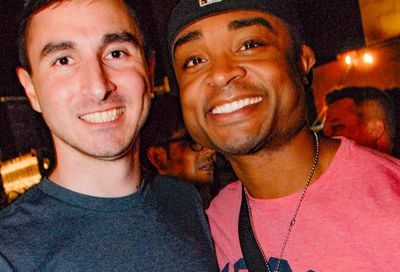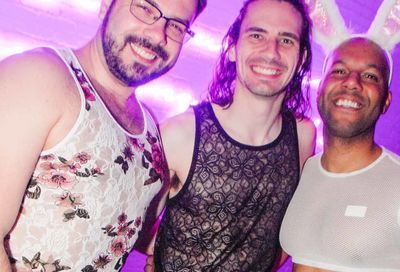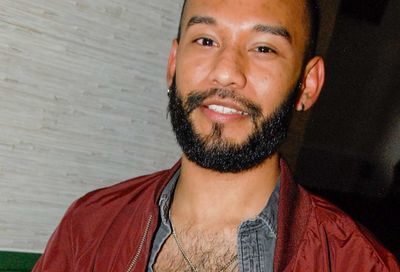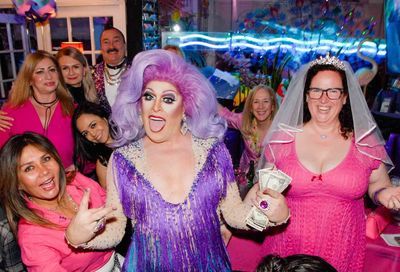Andreas Ocando
2001 Nightlife Coverboy of the Year
 |
Back in the mid 1990s, as political instability roiled his home country of Venezuela, Andreas Ocando wanted to do something different with his life. So he decided to move to Washington, D.C., where he had no family and he didn’t speak the language. Andreas is the kind of guy who sets his challenges high.
Today, six years after his arrival in the city, Andreas works as a personal trainer at Washington Sports Club, tends bar at Omega, and enjoys spending his time with his partner and his wide circle of friends. His fluent English is self-taught, learned from working with people and watching television – perhaps not surprising for someone who as a kid was ”the nerd in the front row.”
 |
That childhood image is well behind Andreas these days, as Nightlife readers could see when he debuted as coverboy in July of this year.
”I had such a good time,” Andreas says of his experience. ”The Friday after the issue I signed probably thirty copies. People were calling me and stopping me on the street. That was great.”
Both affable and appealingly humble, Andreas obviously made an impression – in a close competition, MW readers voted him the Nightlife Coverboy of the Year.
MW: What do you enjoy most about being a personal trainer?
Andreas Ocando: I like changing people’s lives – and not only the physical aspect. The people who train with me have been with me for years. I change their life a little bit, whether it’s about self-esteem or when they have problems and come to me. I love that. When you become a personal trainer, the first thing they tell you is not to get involved personally with the client. Bullshit. There’s no way you can avoid that. You see someone for an hour, three or four times a week, and you get involved. What are you going to talk about all the time? Just technique? I’m a people person. I like being nice to people.
MW: Some people find gyms and working out very intimidating. What do you tell people who feel that way?
Andreas: In the beginning it’s always like that, especially when you’re doing baby weights and you see a monster next to you doing a hundred-pound dumbbell. When you go to a gym for the first time and you have no clue how to lift a dumbbell and you see all these people with great bodies and doing all those exercises, you don’t want to do it. But people feel comfortable with me, and things they wouldn’t do by themselves they do with me. I show them everything from step one so they don’t feel uncomfortable or intimidated. I use a lot of positive reinforcement. I never say ”You did this wrong.” I always say something positive.
 |
MW: Do you think there’s anything about the gay community that reinforces that intimidation?
Andreas: [A lot of] gay people who go out want to look good and they work out really hard. If you go out and you don’t work out, and you don’t even want to take your shirt off, that can make you feel intimidated. And sometimes people are not nice and say things like ”I wouldn’t have sex with you,” or ”I wouldn’t go out with you because you’re not a muscle boy.” That makes me feel kind of bad myself – I used to be really fat.
MW: When was that?
Andreas: A long time ago. I was sixteen and I had a crush on this guy. He had an amazing body. He told me, ”You’re kind of cute, but you’re fat.” I was a big, huge boy – 246 pounds. And I’m just 5’8”. So I decided to lose weight. I lost a hundred pounds in a year. Then I ran into the guy again and he was interested, but I said ”I’m sorry, I’m not interested anymore.” It felt really good.
MW: When did you know you were gay?
Andreas: When I was five, I went to the beach with my family. At the end of the day my father took me to the men’s locker room to shower, and I saw the first naked man in my life. He was like a god to me. I still have that picture in my mind like it was yesterday. Then my father took me and my sisters to the women’s locker room. I was so bored. I wanted to go back to the other room. I didn’t know exactly that I was gay, but I knew I was attracted to men. I knew I couldn’t say anything about it, but when I turned fourteen I came out to the entire world – I didn’t give a shit.
MW: Why did you get comfortable with your sexuality before you got comfortable with your body?
 |
Andreas: Because I never had a problem with being gay. I never asked myself, ”Why is this happening to me?” or stuff like that that most people go through. I always thought that I just had a different attraction than the others – I never thought it was something wrong or abnormal.
MW: So being gay was relatively easy in Caracas?
Andreas: I was never discriminated against. All my friends knew and they were very cool about it. When you feel comfortable with yourself and you show that to people, then they don’t have any problem with that. If you don’t feel comfortable with yourself, you’re not going to succeed. So I never had a problem with my friends or my siblings.
MW: What about your mother?
Andreas: My mother is eighty years old. She came to the city riding a donkey and now she looks up and sees jets flying in the sky. She was homophobic ever since she was a little girl. My father’s first name was Dario, and my mother never called him Dario, because Dario was the name of the first homosexual that my mother ever met. Imagine that. So that was really tough. It took her forever. Now we don’t talk about it, but I know she’s happy knowing that I’m happy.
 |
MW: When did you come to the U.S.?
Andreas: Almost six years ago.
MW: Why did you decide to come to D.C. instead of, say, New York?
Andreas: I pulled out the map and there was D.C., so it was ”Let’s go to D.C.” It’s east coast, it’s a city, and it’s not too cold. New York is too competitive and expensive. And I don’t like Miami. [Actually,] I like Miami for a few days but then you get tired of that whole scene. Miami is not very cultural. Everything is about dance clubs, the beach and the gym, and that’s it.
MW: How hard was it to move here?
Andreas: Scary. I didn’t have anybody here, and I didn’t speak English. I only knew ”This is a pen,” ”My name is Andreas,” ”What time is it,” and ”Where is the bathroom?” That was basically it.
MW: How did you learn English?
Andreas: By asking people, ”How do you say this?” It was not difficult at all because especially in the gay community people think it’s cute, and so everybody tries to help you. I took advantage of that. I was working at the gym and as a bartender, so I was talking in English all day long. On top of that I was watching TV in English, talk shows and all that stuff, to learn the different accents and pronunciations. I remember the first time I saw Fargo I couldn’t understand a word. I was like, ”Are they speaking English?” But I like accents, they give you personality.
MW: It seems like Latin men are pretty welcomed into the gay community, and there’s this very sexualized idea of Latin men. How accurate is that idea? And is it frustrating to deal with?
Andreas: It’s not frustrating at all. And it is not a myth – it’s reality. We are very sexual, a lot more than Americans. Ever since we’re little kids, we hear about sex all the time – all the jokes are about sex, you go to a party and everyone talks about sex. [In America,] I think the new generation is a little more open about it, but for people 28 and older there’s some sort of taboo about it. Your parents don’t talk about it.
MW: Are you a U.S. citizen here now?
Andreas: No, I’m not. I’m going to have that option soon if I want to become a citizen. I’m a resident.
MW: Are you thinking about becoming a citizen?
Andreas: I think so, because you’ve got so many rights here, and I don’t lose my Venezuelan citizenship if I become an American citizen. Also, this is a great country. I like living here. Everything works here. You pick up your phone and it works. You go to the bank and you don’t spend more than ten minutes waiting. You turn on the shower and the water comes out. People take those things for granted here, but in third world countries sometimes you pick up your phone and it’s not working, and you don’t know when it’s going to work again. Sometimes you don’t have water. The system really works here. So why not become a real part of the system? Next elections, I want to vote. I want to be part of that, to vote for the mayor that I want for my city.
MW: What do you like best about D.C.?
Andreas: D.C. is a really beautiful city, but what I like is that it has everything a big city has and it’s not that big. It has great clubs, the biggest museum complex, theatres, operas, whatever – everything that a big city has but you still feel comfortable here. The traffic is not that crazy.
MW: When you mention cultural life and opportunities, what are the types of cultural things that you enjoy?
Andreas: First of all movies – and I’m not talking about Hollywood. I mean movies from all over the world, and we have that here in D.C. I love concerts, dance, symphonies and stuff like that. I don’t like opera, but don’t tell anybody.
MW: You’re thirty-eight now – do you see your life changing as you get older, either in terms of your perspectives or your goals?
Andreas: First of all, I still feel twenty-five. But since I was twenty-five my life has changed a lot. I’m more settled now, and a lot more quiet than what I used to be. When I was younger, all my goals were related to improving myself physically or intellectually. Right now my goals are improving myself inside, my spirit, growing as a human being. I love helping other people grow in that regard as well.
 |
MW: If you look at the gay community overall, what do you see as the most positive thing?
Andreas: That there is a gay community, and people within the community fight for everybody’s rights. You don’t find that in so many countries in the rest of the world.
MW: On the flip side, what would be something you would change?
Andreas: In the gay community your appearance is almost your calling card. If you don’t look good, a lot of people don’t talk to you. You’ve got to look good or you’re ignored. We should give everybody a chance. If they’re not going to be your partner or your trick or whatever, they could be your friend and you could learn a lot from that person. So I would change that – people would give each other more chances.
| 2001 Nightlife Coverboy of the Year Prize Package |
| $500 Cash 17th Street Bar & Grill – Dinner for two with wine (up to $75) 18th & U Street Duplex Diner – $75 Dinner Certificate Annie’s Paramount Steakhouse – $50 Gift Certificate Badlands – 10 Admission passes (Total Value: $100) Banana Café – Sunday Brunch Buffet for 2, including unlimited Mimosas (Approx. Value: $35) Cobalt – $25 Bar Tab Comfort One Shoes – $100 Gift Certificate DC Eagle – $50 Bar Tab Empire Video – 50 Free Rentals Food Bar – Dinner for two (Total Value: $60) Hamburger Mary’s – Dinner for two plus a $50 bar tab Home Rule – $25 Gift Certificate HRC Store – $100 Gift Certificate JR.’s – $25 Bar Tab Kennedy Center – 2 tickets to the opening night of Rodgers & Hammerstein’s Cinderella starring Eartha Kitt, and an autographed photo of Ms. Kitt Leather Rack – $50 Gift Certificate Lizard Lounge – $50 Menu/Bar Guest Certificate; ATLAS Staff Shirt; Selection of Mixed CDs by resident DJ Kostas Loews Cineplex – 10 Movie Passes Omega – $50 Bar Tab Reel Affirmations XII – Two Lincoln Theatre passes to next October’s film festival, includes opening and closing night films, admission to every movie screened at the Lincoln, and the nightly martini parties at the ABSOLUT Pavilion (Total Value: $250) Sheridan’s Steakhouse – $50 Dinner Certificate Studio Theatre – Pair of tickets to Lypsinka: The Boxed Set in June Subari Hair Salon – $25 Service Gift Certificate Tool Shed – Two-Hour Cocktail Party for Winner and 50 friends Two Quail Restaurant – $100 Dinner Certificate Universal Gear – RIPS Coffee Table Book VelvetNation – A pair of admissions to the ”Heaven & Earth” New Year’s weekend event (12/29 DJ David Knapp and 12/31 DJ Alex Lauterstein), including Ultra Lounge passes for both nights (Total value: $140) Washington Plaza Hotel – Luxury Weekend Getaway package includes suite for two nights, dinner for two at No. 10 Thomas Restaurant, and American Breakfast Buffet for two, and during the summer months, two pool passes (Approx. Value: $450) Wet – $25 Bar Tab Ziegfeld’s – $50 Cash |
Support Metro Weekly’s Journalism
These are challenging times for news organizations. And yet it’s crucial we stay active and provide vital resources and information to both our local readers and the world. So won’t you please take a moment and consider supporting Metro Weekly with a membership? For as little as $5 a month, you can help ensure Metro Weekly magazine and MetroWeekly.com remain free, viable resources as we provide the best, most diverse, culturally-resonant LGBTQ coverage in both the D.C. region and around the world. Memberships come with exclusive perks and discounts, your own personal digital delivery of each week’s magazine (and an archive), access to our Member's Lounge when it launches this fall, and exclusive members-only items like Metro Weekly Membership Mugs and Tote Bags! Check out all our membership levels here and please join us today!





















